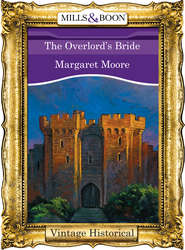По всем вопросам обращайтесь на: info@litportal.ru
(©) 2003-2025.
✖
The Notorious Knight
Настройки чтения
Размер шрифта
Высота строк
Поля
One of the dogs started to growl; a brisk word from the lady silenced him.
Finally Bayard saw a servant. A young, red-haired, freckled wench peered out of the door that led to the kitchen. When she realized he’d spotted her, she ducked out of sight. Perhaps she was just shy, but he was beginning to think Lady Gillian’s household was not a very merry place.
At the far end of the hall they went around a screen that hid another door, then up some steps leading to a narrow, covered wooden walkway. It went from the hall to the keep and was about fifteen feet above the ground.
One had only to set fire to the walkway to make the door to the keep unattainable save by ladders, supposing anyone was willing to risk a hail of arrows, or stones, or boiling water. If there was a well and food inside the keep, they could hold out there for weeks.
The lady unlocked the outer door, then waited while the others entered the building.
Once inside, Bayard surveyed the rough, gray stone walls. Stairs went up and around the inner wall to another level above, while others curved downward, probably leading to chambers used for storage and cells for prisoners.
Like the one in which Armand had been held captive for months, while he’d been treated more like a guest than a prisoner by the Duc d’Ormonde.
The room on the next level into which the lady led them wasn’t precisely a solar, for there was no bed or anything else to indicate it was anyone’s private chamber. Perhaps because it was so isolated from the rest of the castle, it appeared to have been turned into a place to keep accounts and the treasury of the estate, as evidenced by the heavy wooden chest bound with iron bands and a stout lock in one corner.
The sun lit the top of a table beneath an arched window. A holder bearing the remains of a candle sat near the right-hand edge of the table, and a few bits of quill littered the top, as if someone had tidied in a hurry. A chair waited beside the table, its cushion the only concession to personal comfort. A cupboard of the sort used to house records of tithes and other scrolls rested opposite the door.
Bayard reached into his belt and produced the letter Armand had entrusted to his care.
HIDING HER TREPIDATION, Gillian took the rolled parchment and went to the window. She trusted Dunstan and Iain, but she feared her face might betray too much emotion if she was close to them.
Mentally girding her loins, preparing for the worst, she broke the blue wax seal and began to read.
Adelaide hoped Gillian and everyone at Averette was well, as she was. Indeed, she was very happy, but she would explain more about that later. First, she had to warn Gillian.
Reading more quickly, Gillian discovered that Adelaide had helped to thwart a plot against the king that could have led to rebellion and civil war. Unfortunately, one of the conspirators had escaped and Adelaide feared her sisters were now in danger. Adelaide had written to Lizette, too, asking her to return to Averette at once.
Sir Bayard de Boisbaston, to whom Adelaide had entrusted this message, was a skilled knight and a champion of tournaments who had recently returned from the king’s campaign in Normandy. He would be staying at Aver-ette until all the traitors had been caught, imprisoned, or killed.
Gillian cut her eyes to Sir Bayard, who now stood with his hands clasped behind his back, calmly regarding them all like a conquering hero they should be glad to serve.
If he thought to overrule her here, in her home and among her people, he was sorely mistaken!
Grasping the letter tighter, Gillian read more quickly.
Sir Bayard was also the half brother of Lord Armand de Boisbaston, the finest, most honorable, bravest, best man in the world.
And Adelaide’s husband.
Gillian stared, aghast, at the words on the parchment before her. Adelaide married? It couldn’t be. It simply couldn’t be.
Adelaide would never give herself to a husband, never let a man rule her and treat her as his chattel, with no rights or say in anything. Lizette, perhaps, would break their vow, but not Adelaide, who had proposed their vow in the first place and pointed out all the reasons a woman shouldn’t marry.
Armand has agreed that Averette will still be your home and your responsibility, Adelaide had written. He has estates of his own in the north and says they are more than enough for him. Truly, Gillian, he is the best of men.
Gillian didn’t believe her. She knew the strength of infatuation, the power of love, and Adelaide sounded completely smitten. This Lord Armand de Boisbaston might merely be biding his time before swooping down upon Averette like a vulture—especially if he had his half brother already there to support him.
His features full of concern, Dunstan came a few steps closer. “What is it? Is Adelaide ill?”
She shook her head. “No, she’s well.” Or at least she wasn’t sick the way he meant. Sick with love, perhaps.
Yet surely if the unthinkable were true and Adelaide had married, she would come here herself to tell them. She wouldn’t send some stranger to do the deed, or to help protect Averette, either.
She thrust the letter at Dunstan. “Do you think this was written by my sister?”
“It looks like Adelaide’s hand,” he murmured as he started to read.
She knew the instant he saw the thing that had shocked her most, too. “She’s married?” He stared at Sir Bayard. “To your brother?”
“Half brother.”
Half or full, what did it matter?
“Who’s married?” Iain demanded.
Sir Bayard’s jaw clenched before he answered, but his voice was calm when he spoke. “Lady Adelaide has recently wed my half brother, Lord Armand de Boisbas-ton, a knight of the realm.”
“When? How?”
“Four days ago,” Sir Bayard replied with that same damnable composure. “In the usual fashion. I myself was not a witness to the nuptials, being newly returned from France, but I assure you, they are wed and very much in love—so much so that Armand has refused all rights to Averette.”
Something Sir Bayard obviously couldn’t fathom, Gillian realized, and neither could she. “Whoever heard of a lord who refuses more land?”
“Whatever you or I might think of it, that’s the agreement he made with his wife,” Sir Bayard replied. “As a man of honor, he will abide by it. And I give you my word as a knight of the realm that this letter is from your sister and you are in danger.”
“Danger?” Iain repeated. “What danger?”
Gillian quickly described what Adelaide had said about a conspiracy, including the news that Sir Bayard was expected to remain at Averette, something that clearly upset Dunstan and Iain as much as it did her.
“For how long?” Iain demanded.
“Until my brother and his wife deem it safe for me to go,” Sir Bayard replied.
“Am I to have no say in this matter?” Gillian angrily inquired.
“Rest assured, my lady, you’re still in command of Averette,” Sir Bayard said. “I am to provide such advice and assistance as you may require, and nothing more.”
“We’re more than capable of defending ourselves,” Dunstan said, his hand on the hilt of the sword he’d only ever wielded on a practice field.
Sir Bayard raised a brow and crossed his powerful arms. “You’ve had experience commanding men in battle? Or under siege?”
Iain threw back his shoulders. “I was in battle before you left your mother’s teat.”
“That is not what I asked,” the knight returned. “Have you commanded in battle, or under siege?”
Iain’s answer was a stony silence. He’d been in battles, Gillian knew, but his appointment to garrison commander was recent, awarded by her father shortly before he died of apoplexy during yet another drunken rant about his lack of sons and abusing God for cursing him with useless daughters.
Dunstan had no battle experience of any kind. His skill was arithmetic and keeping accurate accounts.











